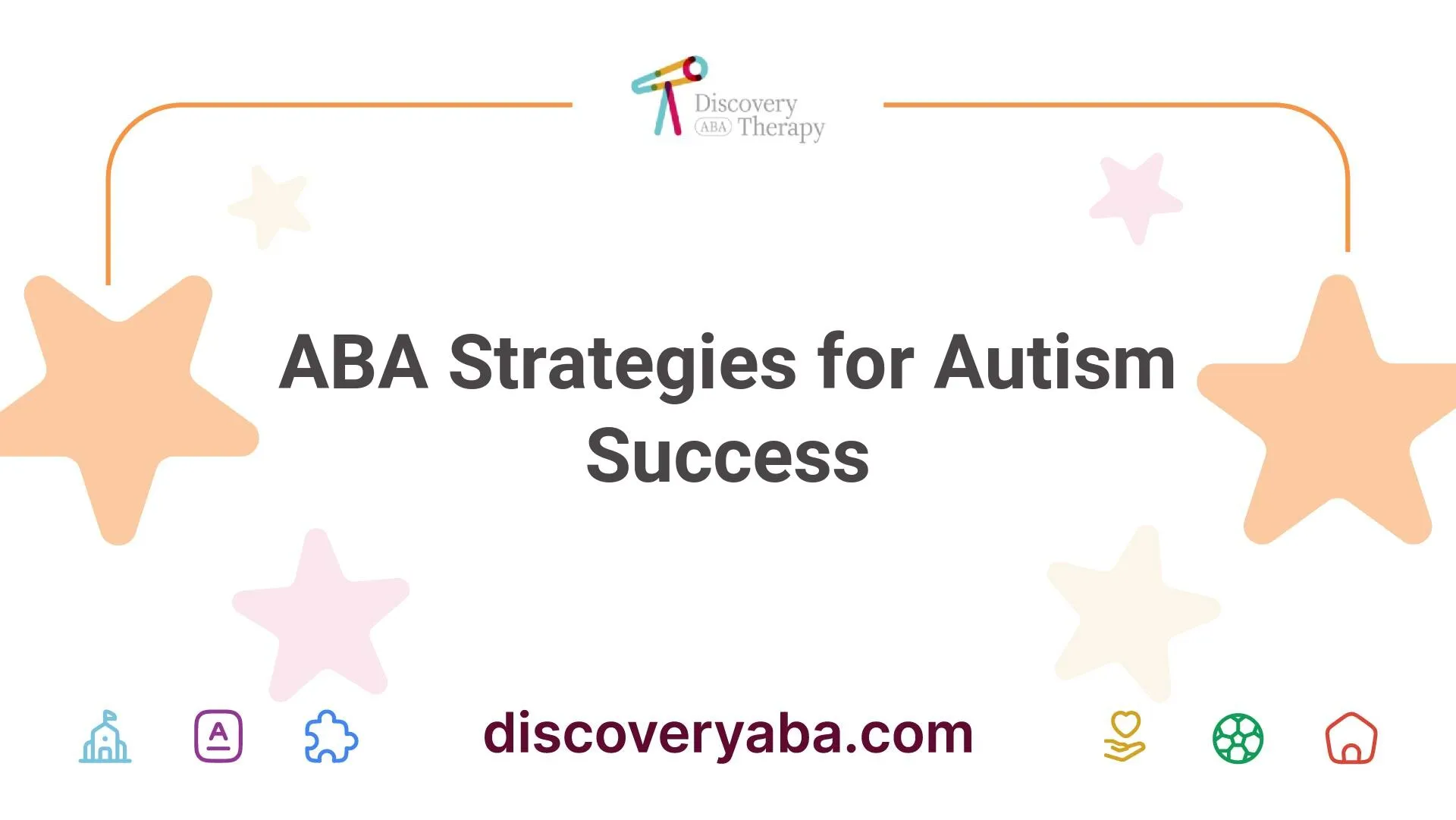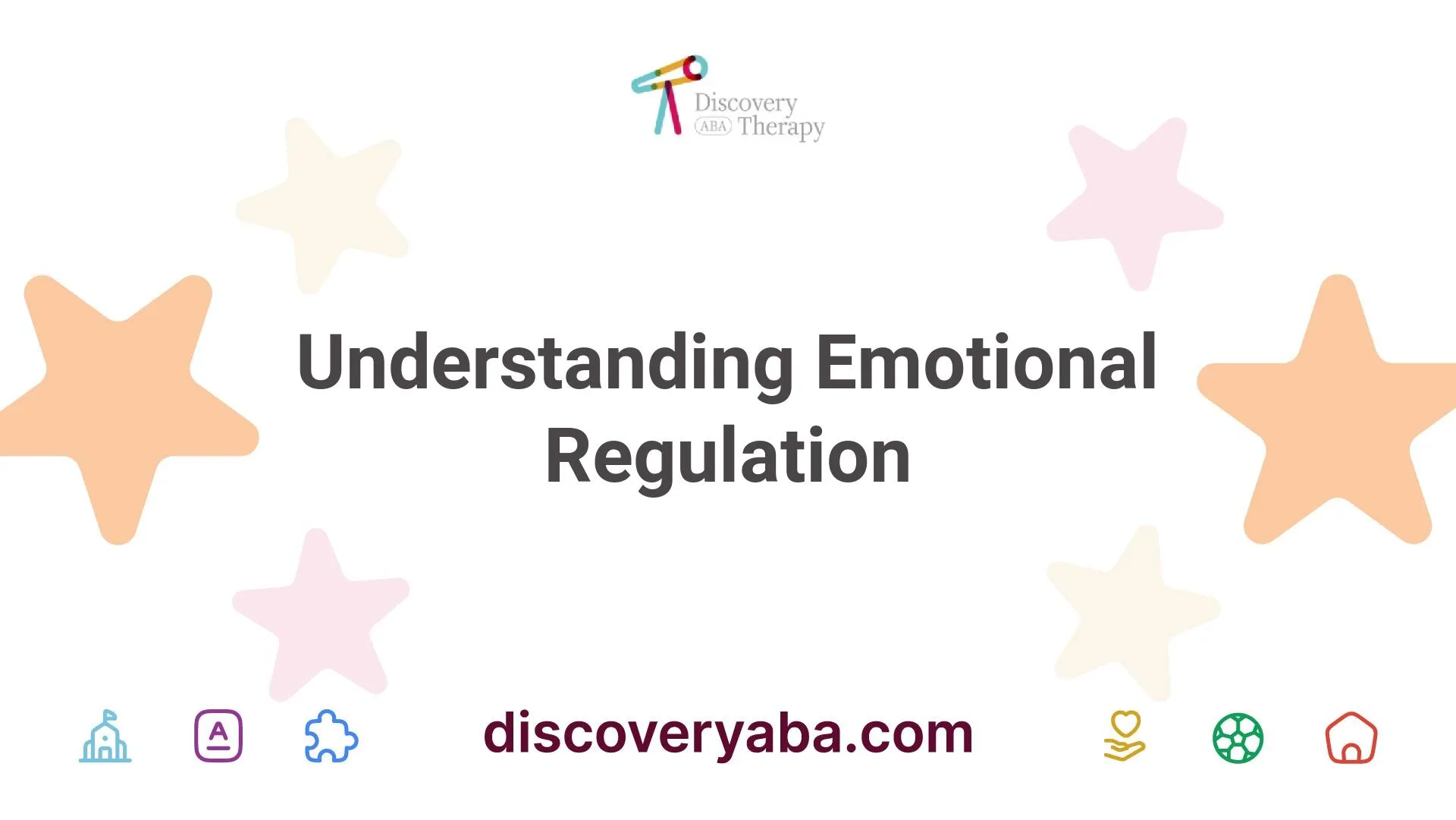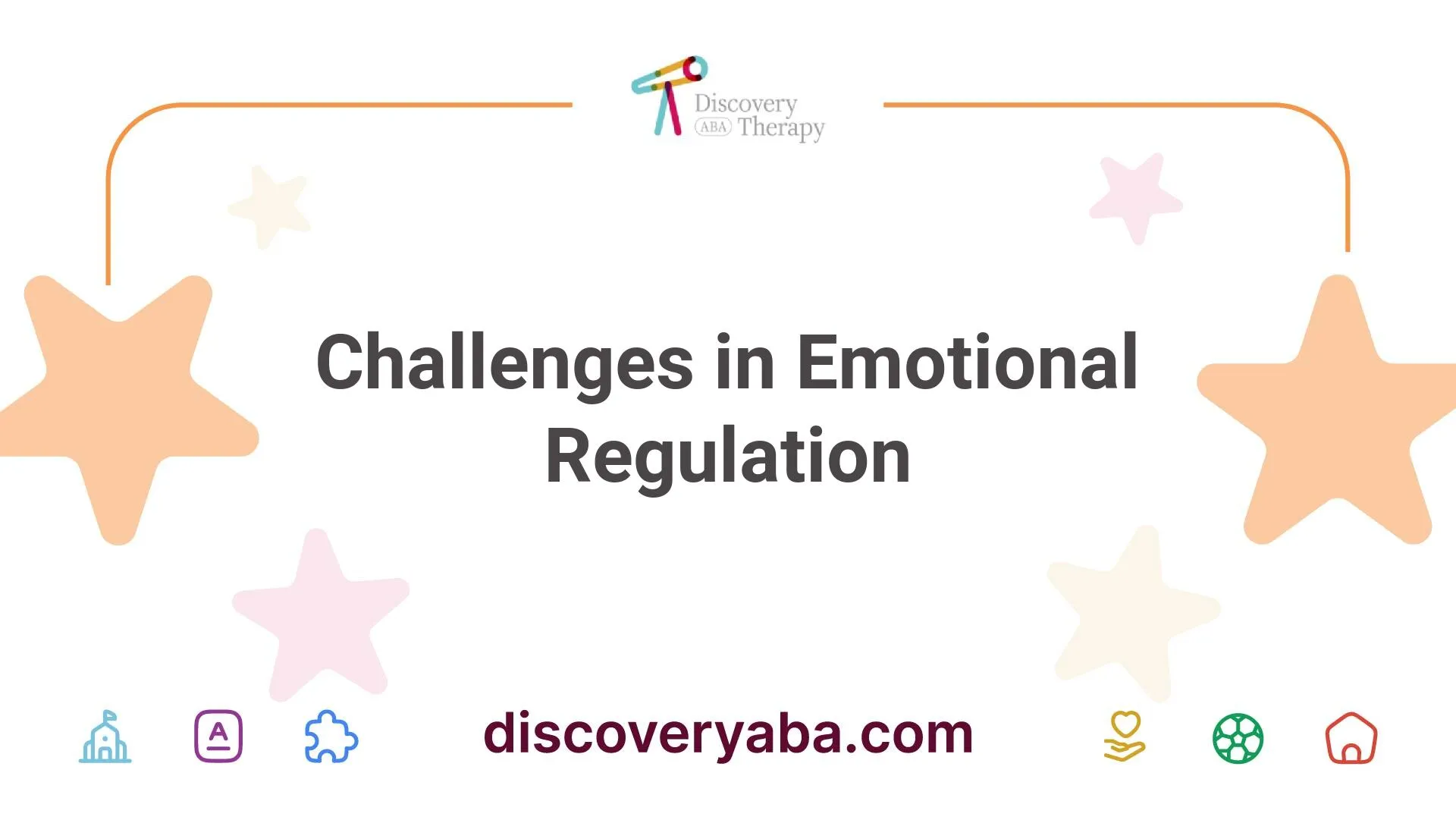ABA Strategies for Autism Success
Discover effective ABA for emotional regulation in autism, unlocking strategies for better emotional control!


Understanding Emotional Regulation
Importance of Emotional Regulation
Emotional regulation is an essential skill for individuals with Autism Spectrum Disorder (ASD). It enables them to effectively manage and control their emotions, which is crucial for responding appropriately in various situations. The ability to regulate emotions can lead to improved social interactions, better communication skills, and overall mental well-being. As documented by My Team ABA, ABA techniques are employed to teach individuals with autism to identify, understand, and manage their emotions effectively.
The need for emotional regulation arises from the unique experiences faced by those on the autism spectrum. They may encounter intense emotions due to differences in sensory processing, communication challenges, and social understanding [1]. Engaging with these emotions in a productive manner helps in building adaptive strategies that are applicable not only in therapy settings but also in real-world environments. This ability to generalize learned skills is emphasized in ABA therapy, ensuring that individuals can function adaptively across various situations.
Emotional regulation can also significantly impact relationships. By developing skills to manage emotions, individuals with autism can navigate social settings more effectively, which can lead to healthier peer relationships. For more insights into how ABA can assist with social interactions, consider exploring our resources on aba for peer relationships in autism and improving social skills with aba.
A thorough understanding of emotional regulation lays the groundwork for the application of ABA strategies. These methodologies not only aim to teach self-control but also focus on fostering emotional intelligence, which is vital for personal growth and integration into society. Emphasizing the significance of this skill can greatly enhance the overall quality of life for individuals with ASD.

Challenges in Emotional Regulation
Individuals with Autism Spectrum Disorder (ASD) often face significant challenges in emotional regulation. These challenges can manifest in various forms, including impulsive reactions and difficulties in response.
Impulsive Reactions
Impulsive reactions are a common obstacle for those with ASD. Individuals may struggle to manage their responses to emotional stimuli, resulting in behaviors such as tantrums, aggression, or even self-injury [3]. The inability to employ adaptive emotional regulation strategies can lead to these impulsive actions, making it essential to address these behaviors through effective interventions like Applied Behavior Analysis (ABA).
Type of Impulsive ReactionDescriptionTantrumsSudden outbursts of frustration or anger.AggressionPhysical or verbal actions directed at others.Self-InjuryHarming oneself as a response to emotional distress.
Difficulties in Response
Difficulties in emotional response can also hinder individuals with ASD from effectively regulating their emotions. Many may find it challenging to understand and express their feelings appropriately. This difficulty can stem from differences in sensory processing, communication barriers, and varying levels of social understanding [1].
Training in emotion identification and management is crucial. ABA techniques can aid individuals in recognizing their emotions and developing appropriate responses, contributing to improved emotional regulation.
Type of DifficultyExampleDifficulty identifying emotionsStruggling to recognize feelings such as anger, sadness, or joy.Inability to express emotions appropriatelyResponding in ways that may seem socially inappropriate.
Addressing these challenges through evidence-based techniques ensures that individuals with ASD can achieve better emotional regulation in various situations, ultimately enhancing their quality of life. For further resources on improving emotional regulation, see our articles on aba for anger management in autism and managing emotional outbursts with aba.
Applied Behavior Analysis (ABA) Techniques
Emotional regulation for individuals with Autism Spectrum Disorder (ASD) can be challenging. Utilizing Applied Behavior Analysis (ABA) strategies is essential to help individuals navigate their emotional responses effectively.
ABA Strategies for Emotional Regulation
ABA techniques address various emotional regulation challenges, enabling individuals with autism to develop adaptive strategies. These strategies focus on countering impulsive reactions by teaching individuals how to express and manage their emotions in more constructive ways.
Evidence-based approaches include:
For more resources on addressing specific behaviors, consult managing emotional outbursts with aba or reducing tantrums with aba therapy.
Cognitive Reappraisal and Suppression
Cognitive reappraisal and suppression are two strategies that can enhance emotional regulation for individuals with ASD.
Research has shown that focusing on cognitive reappraisal techniques can be more beneficial than suppression, which may lead to increased stress in the long run.
To explore further strategies for emotional management, consider looking into aba for anxiety in children with autism or aba for impulse control in autism.
Psychosocial Interventions for Emotional Regulation
ABA and Social Cognition Training
Applied Behavior Analysis (ABA) techniques have been instrumental in helping individuals with Autism Spectrum Disorder (ASD) develop emotional regulation skills. One area of focus within ABA is social cognition training, which aims to improve understanding and management of one's emotions and social interactions. Research has demonstrated that psychosocial interventions, such as ABA combined with social cognition training, can effectively enhance social cognition, communication, and social skills among individuals with ASD.
In a study conducted in Wuhan during 2023 involving 100 boys aged 4 to 11, the application of an ABA program demonstrated notable improvements in social and communicative skills among participants. These findings highlight the effectiveness of tailored training in enhancing emotional regulation, particularly in social contexts [4].
Study OutcomesExperimental GroupControl GroupImprovements in adaptive behaviorsYesNoEnhanced social skillsYesNoBetter communicative abilitiesYesNoReduced separation anxietyYesNo
Improving Social Skills
Improving social skills is a crucial aspect of emotional regulation for individuals with autism. ABA provides targeted strategies to enhance social interactions, enabling individuals to develop the necessary skills to engage effectively with peers. Techniques include role-playing, modeling positive social behaviors, and using prompts and reinforcement to encourage interaction.
By focusing on improving social skills, individuals with ASD can better navigate social situations, leading to enhanced emotional regulation. Positive social interactions can reduce impulsive reactions to emotional stimuli, such as tantrums and aggressive behavior, which are often observed in individuals who struggle with emotional regulation [3].
To further support social skills development, interventions may include group activities that promote interaction and communication among peers. These experiences help individuals practice new skills in a safe environment, fostering confidence and reducing anxiety in social settings. For additional resources on managing emotional responses, consider exploring aba for impulse control in autism and reducing tantrums with aba therapy.
By integrating ABA techniques in emotional regulation and social skills training, individuals with Autism can experience a significant improvement in their ability to manage emotions and engage socially, ultimately leading to enhanced quality of life.
ABA Therapy for Emotional Regulation
Role of ABA Therapy
ABA therapy plays a crucial role in supporting individuals with autism in developing emotional regulation skills. Applied Behavior Analysis (ABA) has been implemented since the 1960s to aid children with autism and related developmental disorders. It utilizes evidence-based techniques to improve social, communication, and adaptive skills.
A board-certified behavior analyst (BCBA) is responsible for designing and overseeing ABA programs tailored to each individual's unique skills, needs, interests, and family dynamics. This customization is vital to address specific emotional regulation challenges faced by the individual. Research has shown strong evidence supporting the effectiveness of ABA therapy, recognized by organizations such as the American Psychological Association and the American Academy of Child and Adolescent Psychiatry.
The focus on generalization of skills is a notable aspect of ABA. This means that techniques and strategies learned in therapy can be applied across various environments, whether at home, school, or in social settings.
Key Benefits of ABA Therapy for Emotional RegulationCustomized programs designed by a BCBAEvidence-based techniques proven to deliver resultsFocus on generalization of skills in multiple settings
Designing ABA Programs
When designing ABA programs aimed at improving emotional regulation, several factors must be taken into account. The BCBA conducts a thorough assessment of the individual's current capabilities and challenges. This includes identifying any specific triggers for emotional outbursts and understanding the learner's emotional responses.
Incorporating strategies such as positive reinforcement can significantly enhance the effectiveness of the program. Positive reinforcement encourages desirable behaviors by providing rewards, motivating individuals to engage in appropriate actions rather than impulsive reactions.
The structure of an ABA program may also include activities focused on teaching calming techniques, communication skills to express emotions effectively, and coping strategies to manage challenging situations. For example, programs may integrate lessons on managing emotional outbursts with aba, as well as developing flexibility in stressful circumstances through developing flexibility with aba therapy.
Ultimately, the success of an ABA program hinges on ongoing evaluations and adjustments. Regular feedback from family members and educators ensures that the program remains relevant and effective in fostering emotional regulation skills.
Components of Effective ABA ProgramsThorough assessment of emotional triggersPositive reinforcement strategiesSkill-building activities focused on emotional regulationContinuous evaluation and adaptation of the program
By utilizing ABA therapy in a thoughtful, structured manner, individuals with autism can develop essential skills to manage their emotions and improve their overall quality of life.
ABA Therapy Effectiveness
Applied Behavior Analysis (ABA) therapy has proven to be an effective method for addressing emotional regulation challenges in individuals with autism. Key strategies, such as positive reinforcement, play a significant role in facilitating meaningful behavior change.
Positive Reinforcement in ABA
One of the cornerstone strategies of ABA therapy is positive reinforcement. This approach encourages the adoption of desired behaviors by rewarding individuals with meaningful incentives such as praise, toys, books, or access to preferred activities [5]. This method has shown to be particularly effective in increasing positive behavior and reducing unwanted actions.
Reinforcement TypeDescriptionPraiseVerbal recognition of desired behaviors.TangiblesRewards like toys or books for appropriate actions.ActivitiesAccess to favorite activities as a reward.
The focus on consistent positive reinforcement not only motivates individuals to display desirable behavior but also enhances their self-esteem and willingness to engage in therapeutic activities. Additionally, reinforcing positive behavior helps in generalizing these skills to various situations beyond therapy.
Benefits of ABA Therapy
The benefits of ABA therapy for emotional regulation in autism are profound. Studies have demonstrated that a substantial percentage of children exhibit considerable improvements following ABA intervention. For instance, a study conducted in 1987 by Dr. O. Ivar Lovass noted that 90% of participants showed significant improvement after intensive ABA therapy, with 47% reaching a level where their behaviors matched those of their peers [2].
Another significant study revealed that 48% of children showed remarkable enhancements after four years of therapy. Such data underline the effectiveness of ABA not only in changing behavior but in truly improving the quality of life for individuals with autism.
Moreover, ABA therapy emphasizes the generalization of learned skills, enabling individuals to apply what they learn in various settings and contexts, which is critical for functional independence. The incorporation of parental involvement in guided exercises has also been identified as crucial for sustained behavioral improvements [4].
Individuals on the autism spectrum often exhibit diverse sensory needs, either seeking or avoiding sensory experiences. By understanding these needs and integrating sensory tools within the therapy context, professionals can further support emotional regulation [1].
In conclusion, ABA therapy effectively improves emotional regulation skills, supporting individuals with autism in navigating their emotions, behaviors, and interactions. For further information on how ABA techniques can address specific issues, consider exploring strategies like reducing self-harm with ABA therapy or managing emotional outbursts with ABA.
Controversies and Considerations
Criticisms of ABA Therapy
Applied Behavior Analysis (ABA) therapy has been a focal point of contention within the autism community. Some autism rights and neurodiversity activists express concerns regarding ABA-based interventions. Criticisms often center around historical issues in behavior analysis, with narratives suggesting that some ABA practices attempt to force autistic individuals to conform to neurotypical standards. This has led to worries about efficacy and ethics, with opponents arguing that such practices can be abusive.
Furthermore, there are claims that some approaches within ABA make erroneous promises of "curing" autism. Critics emphasize that the focus should instead be on supporting individuals in developing emotional regulation and coping strategies without changing their inherent traits. This discourse emphasizes the necessity for a foundational respect for neurodiversity when implementing ABA methods. For those seeking alternatives, consider exploring resources on managing emotional outbursts with aba or reducing problem behaviors with aba.
Holistic Approach to Emotional Needs
In light of the concerns surrounding ABA, practitioners increasingly advocate for a more holistic approach to emotional needs within therapy. This approach emphasizes the individual's overall emotional health, prioritizing understanding and addressing emotional regulation without the traditional pressures of behavioral conformity.
A holistic perspective considers various aspects of a person’s life, including their emotional, social, and physical environments. By recognizing the unique experiences and challenges faced by individuals with autism, therapists aim to develop interventions that are both respectful and effective. This can include integrating practices like teaching empathy skills with aba therapy and improving social skills with aba, while ensuring that the emotional needs of the individual remain at the forefront of any strategy.
Focusing on respect for individual differences and promoting self-advocacy empowers those with autism to more effectively manage their emotional responses and foster a sense of well-being. In doing so, the emphasis shifts from mere compliance to a deeper understanding of the self, leading to greater success in emotional regulation.
References
[2]:
[3]:
[4]:
[5]:
[6]:
Does Your Child Have An Autism Diagnosis?
Learn More About How ABA Therapy Can Help
Find More Articles
Contact us
North Carolina, Nevada, Utah, Virginia
New Hampshire, Maine
Arizona, Colorado, Georgia, New Mexico, Oklahoma, Texas
.avif)




































































































